新编英语教程第三版第三册·U1
- 格式:pdf
- 大小:681.45 KB
- 文档页数:51
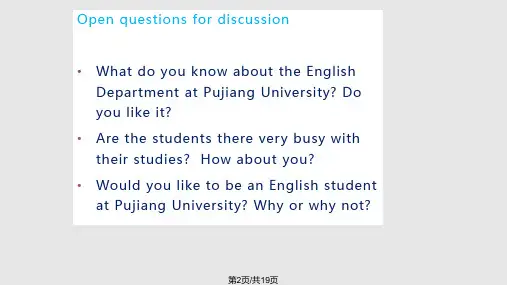
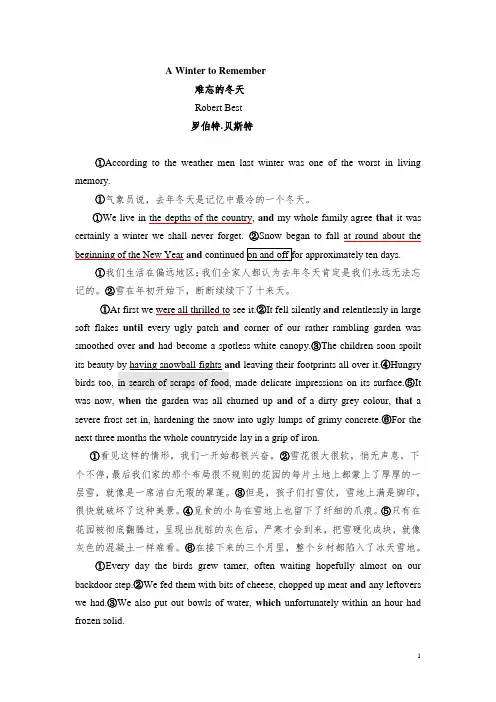
A Winter to Remember难忘的冬天Robert Best罗伯特.贝斯特①According to the weather men last winter was one of the worst in living memory.①气象员说,去年冬天是记忆中最冷的一个冬天。
①We live in the depths of the country, and my whole family agree that it was certainly a winter we shall never forget. ②Snow began to fall at round about thebeginning of the New Year and①我们生活在偏远地区;我们全家人都认为去年冬天肯定是我们永远无法忘记的。
②雪在年初开始下,断断续续下了十来天。
①At first we were all thrilled to see it.②It fell silently and relentlessly in large soft flakes until every ugly patch and corner of our rather rambling garden was smoothed over and had become a spotless white canopy.③The children soon spoiltleaving their footprints all over it.④Hungryon its surface.⑤It was now, when the garden was all churned up and of a dirty grey colour, that a severe frost set in, hardening the snow into ugly lumps of grimy concrete.⑥For the next three months the whole countryside lay in a grip of iron.①看见这样的情形,我们一开始都很兴奋。
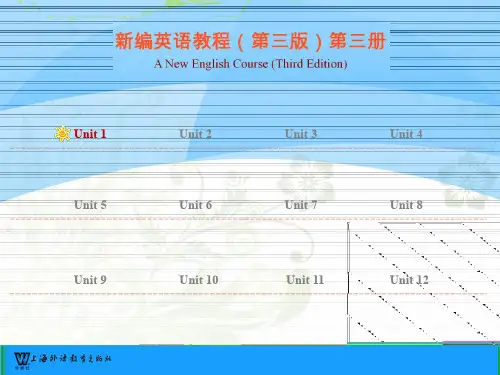
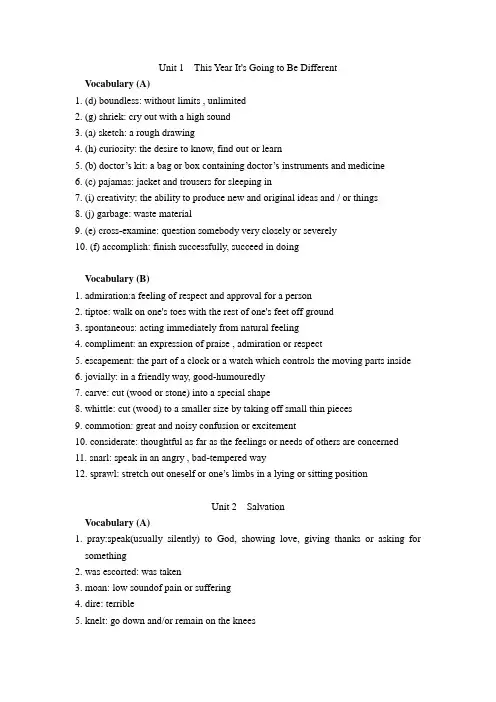
Unit 1 This Year It's Going to Be DifferentVocabulary (A)1. (d) boundless: without limits , unlimited2. (g) shriek: cry out with a high sound3. (a) sketch: a rough drawing4. (h) curiosity: the desire to know, find out or learn5. (b) doctor’s kit: a bag or box containing doctor’s instruments and medicine6. (c) pajamas: jacket and trousers for sleeping in7. (i) creativity: the ability to produce new and original ideas and / or things8. (j) garbage: waste material9. (e) cross-examine: question somebody very closely or severely10. (f) accomplish: finish successfully, succeed in doingVocabulary (B)1. admiration:a feeling of respect and approval for a person2. tiptoe: walk on one's toes with the rest of one's feet off ground3. spontaneous: acting immediately from natural feeling4. compliment: an expression of praise , admiration or respect5. escapement: the part of a clock or a watch which controls the moving parts inside6. jovially: in a friendly way, good-humouredly7. carve: cut (wood or stone) into a special shape8. whittle: cut (wood) to a smaller size by taking off small thin pieces9. commotion: great and noisy confusion or excitement10. considerate: thoughtful as far as the feelings or needs of others are concerned11. snarl: speak in an angry , bad-tempered way12. sprawl: stretch out oneself or one’s limbs in a lying or sitting positionUnit 2 SalvationVocabulary (A)1. pray:speak(usually silently) to God, showing love, giving thanks or asking for something2. was escorted: was taken3. moan: low soundof pain or suffering4. dire: terrible5. knelt: go down and/or remain on the knees6. jet-black: very dark or shiny black7. rocked: shook or or moved gently8. serenely: calmly or peacefully9. grin: smile broadly10. deceive: make sb. believe sth. that is falseVocabulary (B)1. preach: give a religious talk, usually as part of a service in church2. by leaps and bounds: very quickly3. rhythmical: marked by regular succession of weak and strong stresses, accents, movements4. sermon: a talk usually based on a sentence or “verse”from the Bible and preached as part of a church service5. braided: twisted together into one plait6. work-gnarled: twisted , with swollen joints and rough skin as from hard work or old age7. rounder: a person who lives a vicious life, a habitual drunkard8. take his (i.e. , god's) name in vain: use god's name in cursing , speak of god without respect9. punctutate: interrupt from time to time with sth.10. ecstatic: causing great joy and happinessUnit 3 Writing between the linesVocabulary (A)1. contend: argue,claim2. mutilation: destruction3. purchase: buying4. possession: ownership5. transfer: move from one place to another6. dog-eared: having the corners of the pages turned up or down with use so that they look like a dog's ears7. intact: whole because no part has been touched or spoilt8. indispensable : absolutely , essential9. scratch pad : loosely joined sheets of paper (a pad) for writing notes10. sacred : to be treated with great respectVocabulary (B)1. bluntly: plainly , directly2. Restrain: hold back (from doing sth.)3. dilapidated: broken and old; falling to pieces4. scribble: write hastily or carelessly5. unblemished: not spoiled , as new6. crayon: pencil of soft colored chalk or wax , used for drawing7. symphony: a musical work for a large group of instruments8. typography: the arrangement , style and appearance of printed matter9. humility: humble state of mind10. receptacle: a containerUnit 4 Network Designer — Tim Berners-LeeVocabulary (A)1. (c) zip off: move away with speed2. (f) unencumbered: not obstructed3. (j) nifty: clever4. (a) loose: let out5. (d) noodle around: play about6. (b) span: extend across7. (h) debut: make first public appearance8. (e) the élite: a group of people with a high professional or social level9. (g) juncture: a particular point in time10. (i) sparse: inadequately furnishedVocabulary (B)1. exotic: striking or unusual in appearance2. hack: a person paid to do hard and uninteresting work3. stint: fixed amount of work4. random: chance , unplanned , unlooked for5. reside: be present ( in some place)6. access: the opportunity or right to use or see sth.7. cobble: put together quickly or roughly8. lingua franca: language or way of communicating which is used by people do notspeak the same native language9. quintessential: the most typical10. unconventionally: doing things not in the accepted way11. Compromise: sth. That is midway between two different things12. cash in on: profit from; turn to one's advantageUnit 5 AntarcticaVocabulary (A)1. radiate: send out (lights) in all directions2. appreciate: understand fully3. outweigh: are greater than4. hemmed in :surrounded5. habitation: a place to live in6. obscure: make difficult to see7. shatter: break suddenly into small pieces8. haul up: pull up with some effort9. pore: very small opening in the skin through which sweat may pass10. unveiling: discovering, learning aboutVocabulary (B)1. distinctive: clearly marking a person or thing different from others2. spectacular: striking, out of the ordinary, amazing to see3. phenomenon: thing in nature as it appears or is experienced by the senses4. tenure: right of holding (land)5. tempestuous: very rough, stormy6. inclined: likely, tending to, accustomed to7. precipitation: (the amount of) rainfall, snow etc. which has fallen onto the ground8. disintegrate: break up into small particles or pieces, come apart9. granules: small pices like fine grains10. mercury: a heavy silver-white metal which is liquid at ordinary temperature and is used in scientific instruments such as thermometers11. disrupt: upset, disturb12. cushion: paddingUnit 6 The PearlVocabulary (A)1. (f) brush house: house made of small branches2. (i) pulsing and vibrating: beating steadily (as the heart does) and moving rapidly, here “active”, “alert”3. (b) strangle out: get the words out with difficulty in their keenness to speak4. (j) sting: a wound in the skin caused by the insect5. (e) giggle: laugh, not heartily, but often in a rather embarrassed way6. (a) alms-giver: person who gives money, food and clothes to poor people(NB: nowa rather old-fashioned concept)7. (c) residue: that which remains after a part disappears, or is taken or used(here, a metaphor using a chemical term)8. (d) lust: very strong, obsessive desire9. (h) withheld: deliberately refused10. (g) venom: (liquid) poisonVocabulary (B)1. scramble: move, possible climb, quickly and often with some difficulty2. dart: move forward suddenly and quickly3. panting: breathing quickly4. foaming: forming white mass of small air bubbles5. baptize: perform the Christian religious ceremony of baptism, i.e., of acceptance into the Christian Church6. judicious: with good judgment7. fat hammocks: (here) the doctor’s thick eyelids8. cackle: laugh or talk loudly and impleasantly9. semblance: appearance, seeming likeness10. squint: look with almost closed eyes11. speculation: thoughts of possible profits12. distillate: product of distillationUnit 11、每当他午夜下班回家,他总是蹑手蹑脚地上楼,以以免吵醒邻居.Every time when he returned home from work at midnight, he would tiptoe upstairs, trying not to waken his neighbors.2、为了与新来的邻居建立一种和睦的关系,格林先生不失时机地帮她把行李搬进屋子。
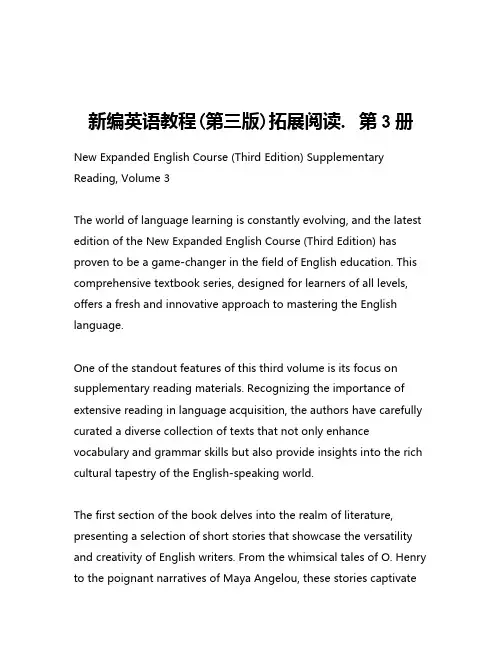
新编英语教程(第三版)拓展阅读. 第3册New Expanded English Course (Third Edition) Supplementary Reading, Volume 3The world of language learning is constantly evolving, and the latest edition of the New Expanded English Course (Third Edition) has proven to be a game-changer in the field of English education. This comprehensive textbook series, designed for learners of all levels, offers a fresh and innovative approach to mastering the English language.One of the standout features of this third volume is its focus on supplementary reading materials. Recognizing the importance of extensive reading in language acquisition, the authors have carefully curated a diverse collection of texts that not only enhance vocabulary and grammar skills but also provide insights into the rich cultural tapestry of the English-speaking world.The first section of the book delves into the realm of literature, presenting a selection of short stories that showcase the versatility and creativity of English writers. From the whimsical tales of O. Henry to the poignant narratives of Maya Angelou, these stories captivatethe reader with their vivid characters, compelling plots, and thought-provoking themes. By engaging with these literary masterpieces, students not only improve their reading comprehension but also develop a deeper appreciation for the nuances of the English language.Complementing the literary section, the textbook also features a series of informative and engaging non-fiction articles. These pieces cover a wide range of topics, from the cutting-edge advancements in science and technology to the intriguing histories and traditions of different cultures. Whether exploring the marvels of the human genome or delving into the origins of ancient civilizations, these articles challenge students to expand their knowledge and broaden their perspectives.One of the standout aspects of the non-fiction section is its focus on contemporary issues. Addressing topics such as climate change, global health, and social justice, these articles encourage students to think critically about the pressing concerns of our time and to develop their own informed opinions on these matters. By grappling with these complex and often controversial subjects, learners not only enhance their English proficiency but also cultivate a greater sense of global citizenship.Interspersed throughout the textbook are a variety of language-learning activities and exercises designed to reinforce the concepts introduced in the reading materials. These activities range from vocabulary-building exercises to grammar-focused tasks, ensuring that students have ample opportunities to apply their newfound knowledge and skills.Moreover, the textbook incorporates a strong emphasis on developing academic writing skills. Through a series of guided writing prompts and feedback mechanisms, students are encouraged to hone their ability to craft well-structured and coherent essays, research papers, and other forms of academic discourse. This focus on academic writing not only prepares learners for success in their educational pursuits but also equips them with the necessary skills for professional communication in the global marketplace.Beyond the printed pages, the New Expanded English Course (Third Edition) also offers a wealth of digital resources to support and enhance the learning experience. Interactive multimedia components, such as audio recordings, video clips, and online quizzes, provide students with additional opportunities to engage with the material and practice their language skills in a dynamic and engaging manner.In conclusion, the New Expanded English Course (Third Edition) is a comprehensive and innovative textbook series that sets a new standard in English language education. By seamlessly blendingliterary and non-fiction texts with targeted language-learning activities, the authors have created a resource that not only strengthens students' linguistic abilities but also cultivates their critical thinking, cultural awareness, and global perspectives. As learners embark on this enriching journey through the pages of this textbook, they will undoubtedly emerge as more confident and well-rounded users of the English language.。

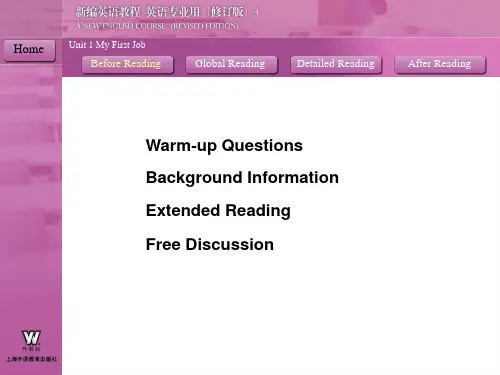
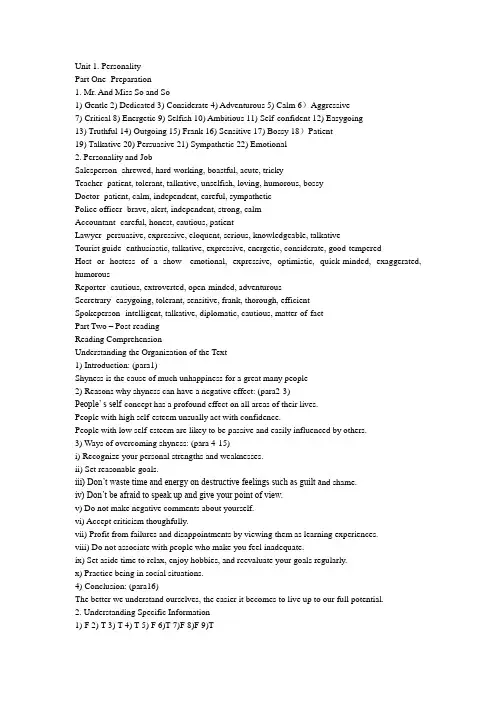
Unit 1. PersonalityPart One- Preparation1. Mr. And Miss So and So1) Gentle 2) Dedicated 3) Considerate 4) Adventurous 5) Calm 6)Aggressive7) Critical 8) Energetic 9) Selfish 10) Ambitious 11) Self-confident 12) Easygoing13) Truthful 14) Outgoing 15) Frank 16) Sensitive 17) Bossy 18)Patient19) Talkative 20) Persuasive 21) Sympathetic 22) Emotional2. Personality and JobSalesperson- shrewed, hard-working, boastful, acute, trickyTeacher- patient, tolerant, talkative, unselfish, loving, humorous, bossyDoctor- patient, calm, independent, careful, sympatheticPolice officer- brave, alert, independent, strong, calmAccountant- careful, honest, cautious, patientLawyer- persuasive, expressive, eloquent, serious, knowledgeable, talkativeTourist guide- enthusiastic, talkative, expressive, energetic, considerate, good-temperedHost or hostess of a show- emotional, expressive, optimistic, quick-minded, exaggerated, humorousReporter- cautious, extroverted, open-minded, adventurousSecretrary- easygoing, tolerant, sensitive, frank, thorough, efficientSpokeperson- intelligent, talkative, diplomatic, cautious, matter-of-factPart Two – Post-readingReading ComprehensionUnderstanding the Organization of the Text1) Introduction: (para1)Shyness is the cause of much unhappiness for a great many people2) Reasons why shyness can have a negative effect: (para2-3)People’ s self-concept has a profound effect on all areas of their lives.People with high self-esteem unsually act with confidence.People with low self-esteem are likey to be passive and easily influenced by others.3) Ways of overcoming shyness: (para 4-15)i) Recognize your personal strengths and weaknesses.ii) Set reasonable goals.iii) Don’t waste time and energy on destructive feelings such as guilt a nd shame.iv) Don’t be afraid to speak up and give your point of view.v) Do not make negative comments about yourself.vi) Accept criticism thoughfully.vii) Profit from failures and disappointments by viewing them as learning experiences.viii) Do not associate with people who make you feel inadequate.ix) Set aside time to relax, enjoy hobbies, and reevaluate your goals regularly.x) Practice being in social situations.4) Conclusion: (para16)The better we understand ourselves, the easier it becomes to live up to our full potential.2. Understanding Specific Information1) F 2) T 3) T 4) T 5) F 6)T 7)F 8)F 9)TV ocabulary1.1) self-couscious (worried and embarrassed about what you look like or what other people think of you.)2) self-confidence (belief i n one’s own ability, power, judgment, etc,; confidence in oneself)3) self-esteem (the feeling that you are someone who deserves to be liked, respected, or admired)4) self-destructive (with thoughts or actions that are counter to one’s own best interests)5) self-worth (the value you give to your life and achievements)6) self-concept (one’s conception or general idea of one’s own basic character and nature)7) self-awareness (realistic knowledge and judgment about oneself)8) self-assurance/self-confidence (the belief that you are able to deal with people and problems easily)2.1) B 2 ) I 3) L 4) A 5) H 6) D 7) E8) N 9) J 10) M 11) C 12) F 13) G 14) K3.1) profound 2)jealousy 3) numerous 4)overweight 5) overcome6) eventually 7) slim 8) compliments 9) diminish 10) reassurance11) detrimental 12) isolated 13) self-esteem 14) accented4.1) reflected 2) concerned/worried 3) profound effect/influence 4) viewed/regarded5) sensitive 6) respond/ react 7) eliminated 8) overcome my fear9) concentrate on 10) made no commentTranslation1) You should spend a reasonable amount of time relaxing and exercising.(spend time on sth/ in doing sth)2) In general children are healthier and better educated than ever before. (than ever before)3) When the right opportunity comes along, he’ll take it.4) Every day he sets aside some time to be with his family and enjoy life.5) I remember those dark streets and walking hand in hand with my father.6) He finally failed to live up to his parents’ expectations.7) In contrast, our use of oil has increased enormously.8) He succeeded in his efforts to overcome his fatal weakness.Part Three – Further Development1. Enriching Your Word Power1) B 2)B 3)A 4) B 5) D 6) C 7)B 8)C 9)A 10)A 11) C 12) BPart Four- Writing and Translation2.1) It is believed that pessimism often leads to hopelessness, sickness and failure.2) Optimism, by contrast, can make you happy, healthy and successful.3) When you fail in something, profit from the failure as a learning experience.4) Think about your strengths and build up self-confidence in front of problems or difficulties.5) Don’t let negative thoughts hold you back.6)Everyone has experienced failures and disappointments, so don’t blame yourself too much.Unit 2 Myths and LegendsPart One – Preparation4. Matching Pictures1. Aphrodite2. Ares3. Hephaestus4. Artemis5. Demeter6. Dionysus7. Poseidon 8. Athena 9. Apollo 10. hermes 11. Hera 12. ZeusPart Two – Post-reading1. Testing Your Memory1) Because they were invited to a feast in the sky.2) He saw the birds were busy preparing.3) He planned to go to the feast/ sky with the birds.4) They didn’t agree because Tortoise was mischievous/ cunning and ungrateful.5) With a sweet tongue, he convinced the birds that he was a changed man.6) He made two wings with all the features he got from each bird.7) All of You.8) Nuts, meat and fish soup, punded yam, yam soup, palm wine, etc.9) For whom have you prepared this feast?10) Because he knew the answer would be ―For all of you‖, which was his new name. So he could enjoy all the food first.11) They were very angry.12) They took back the feathers they had lent him.13) He asked him to take a message to his wife.14) Parrot, because he wanted to take advantage of the chance to get revenge.15) He asked Parrot to tell his wife to bring out all the soft things in his house and cover the ground with them so that he would be able to land safely. But Parrot told his wife to bring out all the hard and sharp things instead.16) His shell was broken into hundreds of pieces.V ocabulary1.1) A. invitation B. invited C. inviting2) A. prepare B. prepared C. preparation D. preparatory / preparation3) A. discoveries B. discoverers C. discovered4) A. approval B. approve C. approved D. approvign E. disapprove5) A. eloquent B. eloquence C. eloquently6) A. faithful B. unfaithful/ faithless C. faith D. faithfully7) A. occasional B. occasionally C. occasion8) A. delivery B. delivering C. delivered9) A. troubesome B. troulbed C. troubled D. troubling10) A. assurance B. assured C. assure2.1) got/ran into trouble 2) no trouble 3) asking for trouble 4) have…trouble5) trouble with 6) in serious/ deep/ big trouble 7) get/getting …into trouble 8) took the trouble3.1) with a pattern of roses.2) prepared a wonderful / good meal for us3) promised faithfully4) deliver this letter5) a selection of milk and plain chocolate6) keep out of mischief / behave themselves7)the sound of distant thunder8) received approval from the government9) in spite of the fact that he drank too much10)agree whether the drug is safe or notPart Three – Further Development1. Enriching Your Word Power1) C 2) C 3) A 4) B 5)A 6) B 7) A 8) B 9) B 10) A 11) B 12) APart Four – Writing and Translation2. Translation Practice万物之初,天体还是一体,充满混沌。
![新编英语教程第三册unit1[1]](https://uimg.taocdn.com/899c26150029bd64793e2c00.webp)
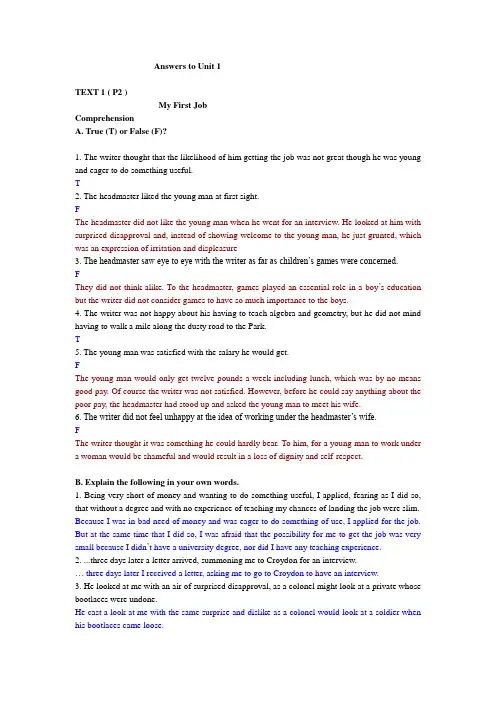
Answers to Unit 1TEXT 1 ( P2 )My First JobComprehensionA. True (T) or False (F)?1. The writer thought that the likelihood of him getting the job was not great though he was young and eager to do something useful.T2. The headmaster liked the young man at first sight.FThe headmaster did not like the young man when he went for an interview. He looked at him with surprised disapproval and, instead of showing welcome to the young man, he just grunted, which was an expression of irritation and displeasure3. The headmaster saw eye to eye with the writer as far as children’s games were concerned.FThey did not think alike. To the headmaster, games played an essential role in a boy’s education but the writer did not consider games to have so much importance to the boys.4. The writer was not happy about his having to teach algebra and geometry, but he did not mind having to walk a mile along the dusty road to the Park.T5. The young man was satisfied with the salary he would get.FThe young man would only get twelve pounds a week including lunch, which was by no means good pay. Of course the writer was not satisfied. However, before he could say anything about the poor pay, the headmaster had stood up and asked the young man to meet his wife.6. The writer did not feel unhappy at the idea of working under the headmaster’s wife.FThe writer thought it was something he could hardly bear. To him, for a young man to work under a woman would be shameful and would result in a loss of dignity and self-respect.B. Explain the following in your own words.1. Being very short of money and wanting to do something useful, I applied, fearing as I did so, that without a degree and with no experience of teaching my chances of landing the job were slim. Because I was in bad need of money and was eager to do something of use, I applied for the job. But at the same time that I did so, I was afraid that the possibility for me to get the job was very small because I didn’t have a university degree, nor did I have any teaching experience.2. ...three days later a letter arrived, summoning me to Croydon for an interview.… three days later I received a letter, asking me to go to Croydon to have an interview.3. He looked at me with an air of surprised disapproval, as a colonel might look at a private whose bootlaces were undone.He cast a look at me with the same surprise and dislike as a colonel would look at a soldier when his bootlaces came loose.4. The headmaster and I obviously had singularly little in common.Apparently the headmaster and I had no similar interests or beliefs.5. The teaching set-up appalled me.The way teaching was organized filled me with terror (or, I was shocked at the teaching arrangements).6. I should have to split the class up into three groups and teach them in turn at three different levels.I should have to divide the class into three groups of three different levels and teach them one after another.7. It was not so much having to tramp a mile along the dusty streets of Croydon, followed by a crocodile of small boys that I minded, but the fact that most of my friends would be enjoying leisure at that time.I felt troubled not because I had to walk for a mile along the dusty streets of Croydon, followed bya group of boys, but because at that time most of my friends would be having a good time and relaxing.8. The prospect of working under a woman constituted the ultimate indignity.The fact that I would have to work under a woman in future made me feel totally humiliated.TEXT 2 ( P3 )How to Do Well on a Job InterviewComprehensionTrue (T) or False (F)1. Most people think that a job interview is a terrible experience.Key: T2. You’re often given a reason if you’re not hired after an interview.Key: FIf you don’t get the job, you’re rarely given any reason why.3. You should neither wear casual student clothing nor overdress yourself when going to aninterview.Key: T4. To demonstrate your ability to be politely sociable, you should initiate small talk before gettingdown to business.Key: FYou should follow the interviewer’s lead and should not initiate any small talk or drag it out.5. You should be frank and list all your flaws to the interviewer.Key: FYou’ll come across as more believable if you admit a flaw – but make it one that an employer might actually like.6. A thank-you note shortly after the interview is one more chance to help you make a goodimpression.Key: TTEXT 3 ( P4 )Comprehension1 FThe Times is to sell the benefits of the classified columns by telephone.2. T3. FEducation is important4. FDrive here is a noun, meaning a forceful quality of mind or spirit that gets things done or initiative (动力、干劲). Applicants must possess this sort of drive.5. FIt’s a job that anyone who thinks he is qualified can apply for.6. TGuided writing ( P5 )I love travelling by train. Fast expresses, slow local trains which stop at every station, suburban trains taking businessmen to their offices and home again; I enjoy them all. It must be the element of romance that attracts me. There is no romance on motorway, which is a box of metal and rubber on a strip of concrete, or in flying through the air in a pressurized tube from one identical plastic and glass airport to another. But trains are different. On a train, you can walk around, look at the scenery, observe your fellow passengers; whereas in a plane all you can see are the clouds and the back of other people’s heads. And then there are the stations. Some, I’m afraid, have become too like airport; others, fortunately, are old and dirty, full of unexpected details and with their own individual peculiarities. Traveling by train remains an adventure, as you try to interpret the timetable, persuade the booking office clerk to sell you a ticket and understand the incomprehensible messages coming over the loudspeaker system. Then there is that delightful uncertainty as you wonder whether you are on the right train, or the right part of the train. There’s nothing like it.Precis writing ( P7 )I applied for my first job before I entered university because I was short of money. The school where I applied for a job was ten miles away from where I lived and I was not sure if I could get the job. However, after a terrible journey I was so depressed that I no longer felt nervous. The Victorian schoolhouses stood amid fumes and dust main road. The headmaster was not at all scholarly, neither was the inside of the house academic looking. By and by I discovered that the headmaster and I had very little in common. He wanted me to teach twenty-four boys from seven to thirteen who, were to be split up into three levels. I had to teach everything including the subjects I abhorred (憎恶). Furthermore, I had to work on Saturdays too. The pay was low. To top it all, I had to work under a woman, the headmaster’s wife, who was the real manager of the school.Paragraph Writing( 略)Letter Writing 〔略〕Comprehensive Exercises ( P9 )1. Spelling ( P9 )1. advertise2. suburb3. range4. interview5. quarter6. depress7. dreary8. indignity9. disapproval10. geometry11. singularly12. leisure2. Dictation ( P9 )The most important day I remember in all my life is the one on which my teacher, Anne Sullivan, came to me. It was the third of March, 1887, three months before I was seven years old. On the afternoon of that eventful day, I stood on the porch, dumb, expectant, I guessed from my mother’s signs and from the hurrying in the house that something unusual was about to happen, so I went to the door and waited on the steps. Hanging down from the porch was sweet-smelling honeysuckle. My fingers lightly touched the familiar leaves and blossoms which had just come forth to greet the sweet southern spring. I did not know what surprise the future held for me.I felt approaching footsteps. I stretched out my hand as I supposed to my mother. Someone took it, and I was caught up and held close in the arms of her who had come to help me discover all things to me, and, more than anything thing else, to love me.3. Listening Comprehension ( P10 )A. True (T) or False (F)?For false statements, write the facts.1. Henry would have liked his interview to begin at once.T2. The secretary waited in the manager’s office while the manager signed the letters.FThe manager signed the last letter and then rang the bell for his secretary to come in and take the letters away.3. The technical journals were very carefully arranged on the top shelf.FIt looked as if the technical journals might at any moment slip off the shelf and fall to the ground.4. The manager’s desk was very tidy.T5. The manager had no idea what job Henry had come for.FThe manager knew what job Henry had come for; he said, “You’ve come about our advertisement for a clerk in the accounts section, haven’t you?〞B. Complete the following sentences with relevant information from the passage.1. The telephone rang just as the manager was explaining t that he was waiting for a long-distance call from Manchester.2. The manager apologized for keeping Henry waiting.3. The bookcase was so large that it covered the greater part of one wall.4. In the box which marked OUT, the manager dropped the letters which he had signed.4. Translation ( P10 )A. Translate the following sentences from Chinese into English.1.他们都认为他成功的可能性很小。
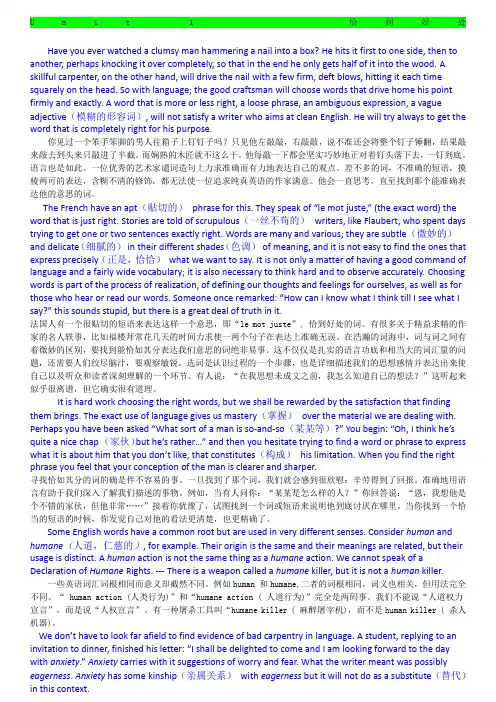
U n i t1恰到好处Have you ever watched a clumsy man hammering a nail into a box? He hits it first to one side, then to another, perhaps knocking it over completely, so that in the end he only gets half of it into the wood. A skillful carpenter, on the other hand, will drive the nail with a few firm, deft blows, hitting it each time squarely on the head. So with language; the good craftsman will choose words that drive home his point firmly and exactly. A word that is more or less right, a loose phrase, an ambiguous expression, a vague adjective(模糊的形容词), will not satisfy a writer who aims at clean English. He will try always to get the word that is completely right for his purpose.你见过一个笨手笨脚的男人往箱子上钉钉子吗?只见他左敲敲,右敲敲,说不准还会将整个钉子锤翻,结果敲来敲去到头来只敲进了半截。
而娴熟的木匠就不这么干。
他每敲一下都会坚实巧妙地正对着钉头落下去,一钉到底。
语言也是如此。
一位优秀的艺术家谴词造句上力求准确而有力地表达自己的观点。
新编英语教程第3册(李观仪主编)第一单元课后练习答案_第1单元答案课文1 ( P2 )我的第一份工作理解A。
真(T)还是假(F)?1。
这位作家认为,尽管他很年轻,渴望做一些有用的事情,但他得到这份工作的可能性不大。
T2。
校长对这个年轻人一见钟情。
校长不喜欢这个年轻人去面试。
他惊讶地看着他,不以为然,没有对这个年轻人表示欢迎,只是咕哝了一声,这是一种愤怒和不快的表情。
就儿童游戏而言,校长和作者意见一致。
他们的想法不一样。
对校长来说,游戏在男孩的教育中起着至关重要的作用,但作者并不认为游戏对男孩有如此重要的意义。
4。
这位作家对他不得不教代数和几何感到不高兴,但他不介意必须沿着尘土飞扬的路走一英里去公园。
T5。
这个年轻人对他能得到的薪水很满意。
这个年轻人一周只挣12英镑,包括午餐在内,这可不是什么好工资。
作者当然不满意。
然而,他还没来得及说什么关于低工资的事情,校长已经站了起来,让这个年轻人去见他的妻子。
6.作者对在校长妻子手下工作的想法并不感到不高兴。
作者认为这是他难以忍受的事情。
对他来说,一个年轻人在一个女人手下工作是可耻的,会导致尊严和自尊的丧失。
B。
用你自己的话解释以下内容。
1。
由于非常缺钱,想做些有用的事情,我申请了,同时也担心没有学位和教学经验,我获得这份工作的机会很小。
因为我非常需要钱,并且渴望做一些有用的事情,所以我申请了这份工作。
但在我这么做的同时,我担心我得到这份工作的可能性非常小,因为我没有大学学位,也没有任何教学经验。
2....三天后,一封信来了,召唤我去克罗伊登面试。
…三天后,我收到一封信,要求我去克罗伊登面试。
3。
他惊讶地看着我,不以为然,就像一个上校看着一个没系鞋带的士兵一样。
他用惊讶和厌恶的眼神看着我,就像上校解开鞋带时看着士兵一样。
4。
校长和我显然没有什么共同之处。
显然,校长和我没有相似的兴趣或信仰。
5.教学设置让我感到震惊。
教学的组织方式让我充满恐惧(或者说,我对教学安排感到震惊)。
新编英语教程3Unit1MyfirstjobUnit 1 My first jobTeaching objectives1. to be familiar with the writing style of narration2. to be familiar with the uses of the –ing and –ed participles3. to be familiar with the building style of the Victorian age4. to be familiar with the school system in the U.K.text 1Teaching procedureI. pre-reading questions1.Self-introduction2. How did you spend your summer holiday? Anything interesting/special to share with the whole class?3.How many of you hold a part-time job? Can you tell us your experience of getting the first job? Were you interviewed by the child’s parents or the head of the school?II. the main idea(3 minutes for reading)1. choosing the statement best sum up the content2. reading comprehension in work book P1(1)discussing and checking the answers in group(2)checking the answersIII. reading or listening to the recording again1. for new words and expressions2. for difficult sentences(1)find out sentences employing –ing or –ed participles and –ing or –ed phrasesIV.Main ideas of each paragraph:-school ten miles away (para.1)-uncertainty before interview-inconvenient transportation (para.2)( awful journey to school)-state of mind after the journey-simple description of schoolhouse (para.3)-environment around the schoolhouse- simple description of the schoolhouse(poor surroundings)-simple description of the schoolmaster (para.4)(unfavorable impression)-simple description of the hallway (para.5)-simple description of the study-the questions asked of me-my answer-my reaction-the pupils at the school (para.6)--terrible teaching program/set-up-my responsibilities (para.7)-my annoyance (para.8)(meager salary)-the last straw (para.9)(working under a woman)V.analysis of the textParagraph 1Q1: Why did the author apply for the job?1. a teaching post …: 宾语后置(postponement, 强调)New information, key partsand long or complicated information are often put at the end of the sentence. ·We heard from his own lips the story of how he had been caught in a trap for days without food.2. teaching post: -ing participle modifying ―post‖3. advised at a school: -ed participle, function as object complement4. being very short of money: adverbial(reason)→adverbial clause of cause or reasonAs I was short of money and w anted to do something useful,…Being in poor health and lacking in teaching experience, he was dismissed.Not having his telephone number, I couldn’t ring him back.5. experience of teaching: gerund = teaching experience: -ing participle6.chances of landing the job: gerund, there is little possibility of7. short of: short of1) having an inadequate supply of: …供给不够的:We're short of cash. 我们现在现金不足。
新编英语教程第三册第三版件介绍本文档是关于新编英语教程第三册第三版件的详细说明。
这个版本是在原版的基础上进行了修订和补充,旨在更好地满足学生的英语学习需求。
本文档将逐步介绍本版件的特点、内容结构以及使用建议。
版本特点1. 更新内容新编英语教程第三册第三版件主要在以下几个方面进行了更新:•单词表:修订了原版中一些过时和不常用的词汇,并增加了一些近年来常用的新词汇。
•语法练习:增加了更多实用的语法练习,帮助学生巩固所学的语法知识。
•阅读材料:增加了更多有趣和实用的阅读材料,帮助学生提高阅读理解能力。
•听力材料:增加了更多地道的英语听力材料,帮助学生提高听力理解能力。
2. 教材结构新编英语教程第三册第三版件的教材结构如下:•Unit 1:介绍一些日常生活中常用的词汇和表达方式。
•Unit 2:讲解一些与工作和职业有关的话题。
•Unit 3:介绍一些关于环境和可持续发展的词汇和知识。
•Unit 4:讲解一些关于文化和传统的话题。
•Unit 5:介绍一些关于科技和创新的词汇和知识。
•Unit 6:讲解一些与健康和生活方式有关的话题。
•Unit 7:介绍一些关于教育和学习的词汇和知识。
•Unit 8:讲解一些与旅行和交通有关的话题。
每个单元都包含了词汇、语法、听力、阅读和写作的练习,帮助学生全面提高英语能力。
使用建议1. 阅读顺序建议按照教材自身的结构进行阅读,逐单元进行学习。
每个单元的内容都是有一定逻辑关系的,按部就班地学习,能更好地理解和掌握知识。
2. 多练习在学习过程中,要多进行词汇、语法、听力、阅读和写作的练习。
通过练习能够更好地巩固所学的知识和技能。
3. 制定学习计划制定一个合理的学习计划,安排每天一定的学习时间。
坚持学习和练习,才能够取得良好的学习效果。
4. 寻找学习资源除了教材本身提供的练习题以外,还可以寻找其他相关的学习资源,比如网上的课程、听力材料、阅读材料等等。
多样化的学习资源有助于提高学习效果。
DictationUnit 1The most important day I remember in all my life is the one on which my teacher, Anne Sullivan, came to me. It was the third of March, 1887, three months before I was seven years old.On the afternoon of that eventful day, I stood on the porch, dumb, expectant, I guessed from my mother’s sign and from the hurrying in the house that something unusual was about to happen, so I went to the door and waited on the steps. Hanging down from the porch was sweet-smelling honeysuckle. My fingers lightly touched the familiar leaves and blossoms which had just come forth to greet the sweet southern spring. I did not know what surprise the future held for me.I felt approaching footsteps. I stretched out my hand as I supposed to my mother. Someone took it, and I was caught up and held close in the arms of her who had come to help me discover all things to me, and, more than anything else, to love me. Translation:1.They al believe that he had a slim chance of success.2.I didn’t know why she has an air of sadness all the time.3.It was after all the students had taken their seats that the president of the students’union proceeded to announce the camping itinerary.4.The stomach is a vital organ of the human body; please take good care of it.5.He considered it ridiculous for the general manager to attach so much importanceto those routine trifles.6.Her study, which ranged over many languages and cultures, was full of challenge.7.As is scheduled, all the members of the stuff take turns to do late duty.8.She was greatly upset at the thought of leaving her parents and living on her ownin a remote area.9.We do not worry so much about her qualifications for the job as about her health.10.He was greatly excited about the prospect of leaving a cruise around the world. Paragraph translationFrom Fred’s point of view, the interview was very smoothly indeed. Five days before, he had applied for a job at a small business company and now he was being interviewed by one of its directors.Fred had been working as a salesman. He wanted to change his job not because he was short of money, but because as a salesman he could hardly enjoy any leisure at all.Fred had been worried that he might lose his head and say something silly, but fortunately he found that he had a lot in common with the director.It was clear that the director was quite satisfied. Fred was thinking that his chances of landing the job were favorable when the director proceeded to ask, “Do you mind working overtime?”Précis writing (Unit 1)I applied for my first job before I entered the university because I was short money. The school where I applied for a job was ten miles away from where I lived and I was not sure if I could get the job. However, after a terrible journey I was so depressed that I no longer felt nervous. The V ictorian schoolhouse stood amid fumes and dust by a busy main road. The headmaster was not at all scholarly, neither was the inside of the academic looking. By and by I discovered that the headmaster and I had very little in common. He wanted me to teach twenty-four boys from seven to thirteen who were to be split up into three levels. I had to teach everything including the subjects I abhorred. Furthermore, I had to work on Saturdays too. The pay, however, was low. To top it all, I had to work under a woman, the headmaster’s wife, who was the real manager of the school.Dictation Unit 2The sun was getting warm as Philip put on his skates and prepared to get on the ice. At the edge of the lake the ice was still quite hard, and he did not seem to realize there was any danger, but nearer the middle of the lake the warm sun had already begun to melt the ice.After making a few practice turns, Philip set out to cross the lake at its widest point. In order to make himself go faster, he tried to race his own shadow as it fell on the ice ahead of him. When he was about half way across, the weak ice suddenly broke beneath his weight at once and he fell through it. For 20 or 30 seconds afterwards he was not even able to scream. Then at least he found his voice, shouted for help, and almost immediately afterwards blacked out.When he opened his eyes again, he was lying in bed in his own home, with his father bending anxiously over him. “Y ou should have known better than to do a silly thing like that!” were the first comfortless words he heard after his narrow escape.Translation:1.This old man lived overseas when he was young and had many unusual experiences.2.She is a well-liked physics teacher with a lot of teaching experience.3.My shoes are brand new; I’d rather stay until it clears up.4.Upon leaving the small house where she lived in her childhood, she looked her good-bye atevery familiar object around.5.He was asked to leave for Xi’an at such short notice that he didn’t even leave time to call hiswife.6.Their reluctance to join us in the speech contest really spoilt our fun.7.Please note that every student should keep classroom discipline, and you are no exception.8.I don’t care so much about working overtime occasionally, but about your calling off myholidays with no notice.9.The speaker cleared his throat to claim the attention of the audience.10.He was tired of hustle and bustle of the urban life and hoped to move to, expecting a changein his current life style.Paragraph translationWhen I was very little, I longed to go to the countryside with my father and brother, but Inever got a chance. Father went once a year during his holiday to the countryside where my grandmother lived. As a rule, he took my brother Qiangqiang with him. I remember when I was four, there was a lot of talking about countryside-going as Father’s holiday was drawing near. I was certain that this time Father would take Qiangqiang along as usual. But one morning while I was in the bedroom playing with my doll, Mother called up, “Pingping, come down.” To my surprise, Mother told me with tears in her eyes that I would be sent to my grandmother’s. I was delighted and looked everywhere for my father and Qiangqiang, but they were nowhere to be seen. When the time came for me to leave, Mother murmured, “ Pingping, try to be good. Mama and Papa are sure to come to see you soon.” It was not till then that I knew I would be going to the countryside alone, all alone. I clung to my mother, weeping tears of sadness.Dictation Unit 3Strange things happen to time when you travel, because the earth is divided into 24 zones, one hour apart for every two zones. Y ou can have days with more or fewer than 24 hours, and weeks with more or fewer than seven days.If you make a five-day trip across the Atlantic Ocean, your ship enters a different time zone every day. As you enter each zone, the time changes one hour. Traveling west, you set your clock back; traveling east, you set forward. Each day of your trip has either 25 or 23 hours.If you travel by ship across the Pacific, you cross International Date Line. BY agreement, this is the point where a new day begins. When you cross the line, you change your calendar one full day, backward or forward. Traveling east, today becomes yesterday; traveling west, it becomes tomorrow.Dictation Unit 4The Global Theater is a playhouse built just outside London in1599. It is the most famous theater in history: on its stage Shakespeare’s greatest plays were first performed. Big enough to hold about 2,500 people, the Globe had three levels of galleries surrounding an unroofed yard. Extending from one side of the yard to the center was an open stage. From the stage floor rose two posts to support an overhanging canopy known as the “heavens”.The Globe was built in London by the Burbage brothers in 1599. At the same time, wishing to bind the Lord Chamberlain’s company closely to the new playhouse, they planned a novel partnership in which the brothers divided ownership of the Globe among themselves and five of the actors in the company, one of whom was Shakespeare.After 1609, when the company opened a second theater, the Globe became less important. ON June 29, 1613, during a performance of Shakespeare’s King Henry the Eighth, fire destroyed the Globe. It was rebuilt within a year but was destroyed forever by the Puritans in 1644.Dictation Unit 5Throughout the long period, the French showed noticeably more enthusiasm for aChannel tunnel than the British. This may seem curious, seeing that France already has many land frontiers, whereas for Britain a tunnel would be its first fixed link with the Continent, and thus more valuable. But the British were held black by their insularity, and especially by fears that an invader might be able to make use of the scheme. Happily, all that is past. Today Britain’s politicians and business circles have shown themselves as eager as the French.Those who take a wider and longer-term view believe that these possible drawbacks for Britain will be far outweighed by the advantages. Pa ssengers by express train will be able to do the journey at least an hour faster than by sir, city center to co city center, and without any tedious waits at airports. Also the fares will be cheaper. So the tunnel will probably stimulate a vast increase in tourism and business travel between London and Paris.Dictation: Unit 6Y ou probably know that there are ghost towns scattered across various parts of the United States. Perhaps you have even had opportunity to read about a ghost town or visit one. These ghost towns, which were so named because nearly all the people moved away, were once as lively as circuses. Of course, that was a long time ago.Back in the late 1800s, lots of men travelled all the way to California in search of gold. They were so hungry for gold that you could easily imagine them starving to death if they didn’t find it. In fact, some men were so greedy that they pushed their luck too far and died. It’s been said that gold fever was so bad that many men left their families and jobs in the East to follow their dream of riches in the West. Sometimes miners would find gold and silver close together. When this happened, people rushed to the area like ants to a picnic site. Houses and stores appeared almost overnight, and towns grew like weeds.Gradually, all the gold was mined and people began to move away.Précis WritingThe Chunnel, as it is known, was to open at last after seven years of construction. An apprehensive atmosphere pervaded the English end of the Chunnel Tunnel. A retired government worker and his wife voiced their strong sentiments against the forthcoming opening of the Chunnel and the French. Meanwhile, on the French side, a farmer showed his contempt for the English. But the Chunnel was to materialize, whether they like it or not.The inauguration ceremony, to be presided by the English Queen and the French President was scheduled on May 6, 1994. The Chunnel would then sever as a shuttle service, bringing great convenience to the people on both sides.On June 28, 1991, dozens of journalists took the construction workers’train to take part in the breakthrough ceremony. Work on the Chunnel was not quite finished; the walls bare, and the air filled with dust. Then, the breakthrough—light, music, applause, champagne corks popping, swarms of French workers clambering to theEnglish side and embracing the English workers. Only at this point did one Englishman feel that this Chunnel was his too. As more and more Frenchmen climbed over, he guessed that there would be a deluge of visitors after the completion of the Tunnel.Dictation: Unit 7Man has a big brain. He can think, learn and speak. Scientists use to think that human were different from animals because they can think and learn. They know now that animals can learn—dogs, rats, birds and even worms can learn. Scientists are now beginning to understand that humans are different from animals because they can speak. Animals cannot speak. They make noises when they are afraid, or angry, or unhappy. Apes are our nearest cousins. They can understand some tings more quickly than human beings, and one or two have learned a few words, but they are still different from us. They cannot join words or make sentences. They cannot think like us because they have no language, as we mean it. They can never think about the past or the future. Language is a wonderful thing. Man has been able to develop civilization largely because he has language. Every child can speak his own language very well when he is four or five—but no animals learn to speak. How do children learn? Scientists do not really know. What happens when we speak? Scientists do not know. They only know that man can speak because he has a big brain.Unit 8Dictation:Many students who call themselves bad readers nevertherless do read some thingd successfully. They may read novels or they may read the sports page every day. But a textbook is a different matter. A textbook gvies a lot of trouble. Why is that? One reason is lack of interest. Another is that they are often unfamiliar with the subject about which they are reading. But a third reason is that they try to read a textbook as if it were a novel or sports story or a problem to be solved by Ann Landers. They respond to the textbook inapropriately.How you read something depends on the author’s purpose in writing. There are basically four purposes for writing. Some authors writes to tell a story; others write to create an image in your mind; some write to inform or teach you; and still others write to convince you of a particular viewpoint. Each of these four purposes requires a defferent response as you read. If you respond differently to different types of writing, you will find that your reading will be much easier.Unit 9Dictation:Tom King could feel Sandel growing stronger against him. He saw youth recuperate. From instant to instant Sandel grew stronger. His punches, weak at first, became strong. Tom King sawthe gloved fist driving at his jaw, and wanted to guard it by raising his arm. But the arm was too heavy. It would not lift itself. Then the gloved fist landed home. Tom felt a sharp snap and blacked out.When he opened his eyes again he was in his corner, and he heard the audience screaming and cheering. His second was blowing cold waters gloves had already been removed, and Sandel,bending over him, was shaking his hand. He bore no ill will toward the man who had put him out, and heUnit 10Zululand is a historical region of northeastern Natal, which is a province in the eastern part of the Republic of South Africa. Under the former South African Government’s policy of racial separation and separate development of the race, black South Africans had been divided into “national”groups. These groups were to develop their own political, social, and cultural life in homelands assigned to them by the government.Zululand historically was the northeastern section of Natal. It was inhabited by the Zulus, a people who became powerful in the early 19th century under their king, Shaka. In the middle of the 19th century, they warred with Boer settlers who went into the area, and later with the British. In 1879, the British invaded Zululand and were defeated by the Zulus. However, the Zulus were later defeated and the British took possession of Zululand in1887. It became part of Natal in 1897.。
《新编英语教程》(修订版)第三册Unit 1[见教材P1]My First Job我的第一份工作Robert Best罗伯特.贝斯特①While I was waiting to enter university, I saw②Being very short of money andwanting to do something useful, I applied, fearing thatmy chances of landing the job were slim.①那年,我考上了大学,还没有入校时,在本地一家报纸上看到一所学校发布广告,招聘一名教师。
②这所学校位于伦敦郊区,距离我住的地方大约[有]十英里。
③当时因为急需用钱,又想做些有意义的事情,于是我就提出了申请。
④但是同时,我又担心,既没有学位又没有教学经验,所以获得这个职位的可能性非常小。
①However, three days later a letter arrived, summoning me to Croydon for an interview. ②It proved an awkward journey: a train to Croydon station;a ten-minute bus ride and then a walk of at least a quarter of a mile. ③As a result I arrived on a hot June morning too depressed to feel nervous.①然而,三天以后来信了,通知我到Croydon参加面试。
②路很不好走,先坐火车到Croydon车站,再坐十分钟的公交车,最后步行至少0.25英里才到达目的地。
③那可是六月天的上午,天气很热,我非常沮丧,也非常紧张,简直都崩溃了。
①and②The front garden was a gravel square;four evergreen shrubs stood at each corner, where they struggled to survive the dust and fumes from a busy main road.①学校是一幢维多利亚时代的红砖建筑,有山墙,有很大的垂直拉窗,闪闪发光,让人感觉单调乏味。